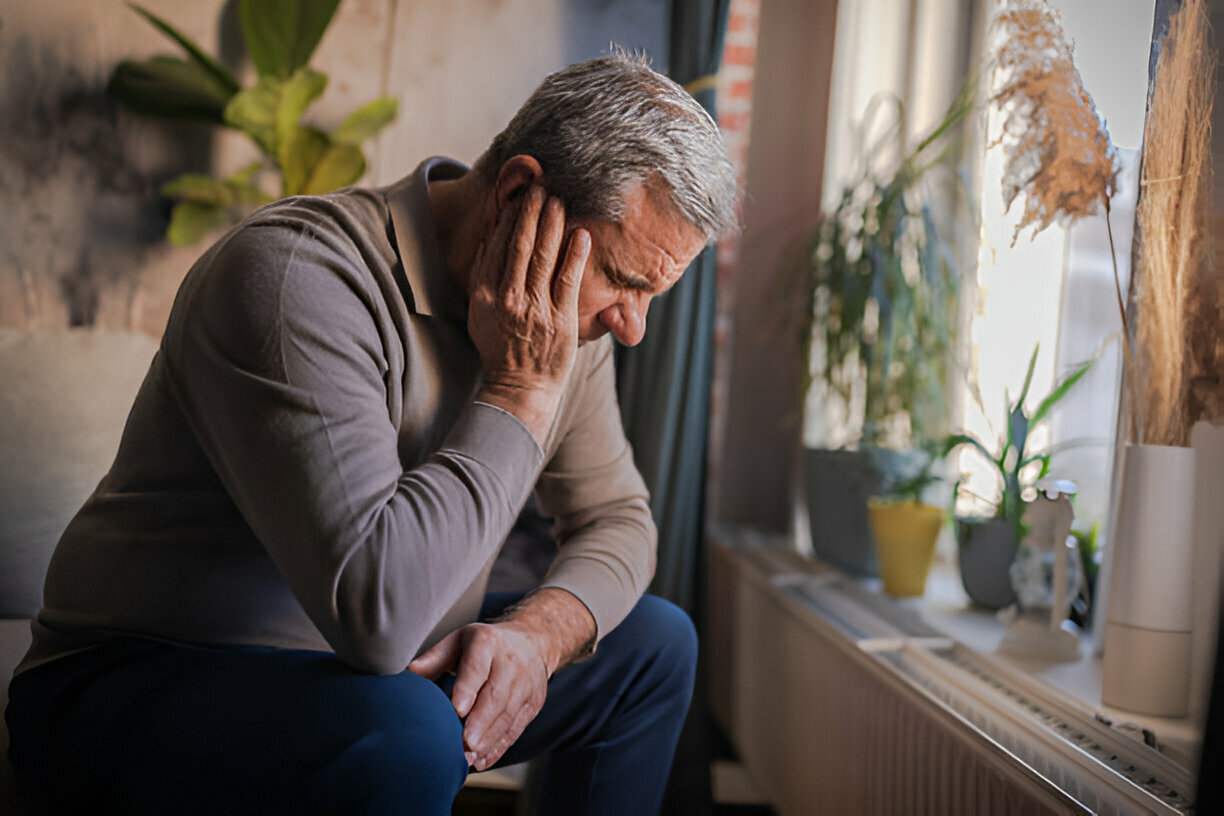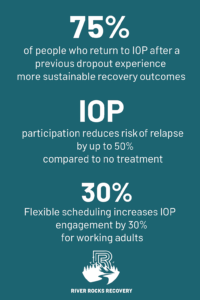I started treatment once. I walked in, felt hopeful—and walked out a few days later. I couldn’t shake the feeling I’d be missing too much: work deadlines, family dinners, regular life. If you’ve said “I don’t have time for this,” or “I’ve tried and failed,” I want you to hear this: you can ask for help without erasing your life. Our Intensive Outpatient Program in Middletown, Ohio meets you right where you are—even if you’ve ghosted treatment before.
You Can Hold Everything Together—Temporarily
Maybe you’ve tried inpatient programs and felt adrift when you returned home. Or maybe you dropped off halfway through IOP once, overwhelmed. IOP at River Rocks Recovery is designed for people just like you. It merges recovery with reality. You don’t have to pick between life and healing. Instead, healing becomes part of your ongoing story.
Yes, treatment matters—but so do your obligations, your commitments, and your world. IOP lets both live. Every session you attend becomes part of your weekly rhythm, not a disruption.
Consistent Support That Fits in Your Calendar
Instead of clearing your plate for 30 days, you build treatment into your existing schedule. Our IOP meets multiple times a week—group sessions, one-on-one counseling, and practical workshops—structured with your work, family, and extracurriculars in mind.
- Morning and evening slots give you options.
- 3-to-4 week programs offer flexibility.
- You stay connected to your support system.
This consistency fosters trust. It’s not about intensity over sacrifice—it’s about sustainable, real-life healing.
Understanding the Fear of Dropping Out
Let’s be honest: starting, stopping, and starting again isn’t a sign of weakness. It’s proof you tried—and you’re still trying. Many people in IOP have walked away before. They came back, not because they failed, but because they know the value of showing up a bit differently this time.
Here, there’s no shame. Whether your last treatment was six months ago or six years, IOP places you in a different context: one of incremental progress, self-compassion, and second chances.
You Share the Struggle in Real Time
Once, I missed two appointments in a row. At first, I thought I’d get judged. Instead, in the next session, someone raised their hand and said, “I’ve done that, too.” It opened the room. That exchange ended up being as powerful as any material we covered that week.
IOP matches your lived experience with peers living theirs. It’s not theory; it’s now. If something in your world goes sideways—or miraculous—you bring it in. And you learn how to walk through it with tools and connection. The support is flexible, not fragile.
Learning Tools That Fit Your Life
Every session isn’t a lecture. It’s a chance to discover how you can navigate triggers, stressors, and cravings in real-time. Recovery in IOP is practical.
You learn:
- Carrying calm: breathing techniques you can use in a boardroom or during bedtime chaos.
- Boundary-setting: how to say no without guilt when work or family demands get heavy.
- Craving strategy: what to do the moment you feel vulnerable—to interrupt the cycle before it spirals.
These aren’t theoretical—they’re lifesaving when you’re back on the clock, not on pause.
You Don’t Just Quit the Substance — You Rebuild Purpose
Often, people think treatment ends addiction; they don’t see it rebuilds life—and sense of self. In IOP, recovery becomes a platform to rebuild your daily reality. You’re not just saying no to alcohol or drugs. You’re saying yes to vision, clarity, creativity, connection.
Two weeks into IOP, a client began journaling about reconnecting with a childhood hobby—one they quit decades ago to make space for drinking. Now they’re planning to try it again. That spark, once buried, got dusted off in group. That’s what happens here.
A Metaphor: Treatment as Training, Not Break
Think of IOP like training for a marathon while still working and parenting. You don’t pull a disappearing act—you build endurance, step by step, in the rhythm of your life. Each session is a training run, sharpening your skills, tuning your muscles, but you still show up for work, family, daily life. You don’t pause your life—you upgrade it.
What Happens After You Finish
IOP doesn’t leave you stranded. You finish with tools—but also with continuity. River Rocks Recovery offers:
- Aftercare planning tailored to your needs
- Option to move into continued care or stepped-down services
- Alumni groups and local events in Middletown and Hamilton, Ohio to keep the community going
Your finish line doesn’t feel like a cliff—it feels like a launch pad.
FAQs for People Who’ve Stepped Away
1. What if I tried IOP before and left?
This iteration of IOP is different. It’s flexible, foolproof, and judgment-free. We work with your real limitations—and help you build around them.
2. Will going back feel like failure?
Not at all. It’s proof you care enough to keep trying—and we celebrate that.
3. How long do I stay in IOP?
Typically, programs run 8–12 weeks, but your pace sets the benchmark. We adjust to what you need.
4. Can I juggle work, family, and IOP?
Yes. Pick session slots that fit your life, not the other way around. Then build your journey around them.
5. What if I can’t open up in group therapy?
That’s okay. We invite you to listen. To observe. To step in when you’re ready. Your learning happens whether you speak or not.
6. Where do I go when IOP ends?
We guide you into next steps—alumni groups, community recovery meetings, continued therapy. You don’t transition alone.
Real Talk from Real People
- “I ghosted once before, thinking I’d get overwhelmed. But this felt different. I could live life and help myself at the same time.”
- “I never thought an outpatient program could kick-start real change—until I did it.”
These aren’t quotes for clout. They’re echoes of people who once wondered if they could make it—then did.
You Don’t Have to Say “Yes” to Everything
Treatment is hard. Choosing where to say yes is powerful. And saying yes to IOP is saying yes to both healing and living. You can have both.
Ready for a second look?
Call (888) 905-6281 to learn more about our IOP services in Middletown, Ohio.





























